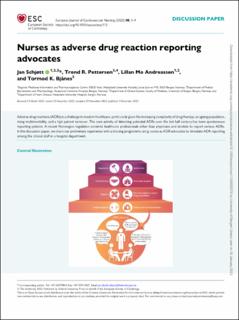| dc.contributor.author | Schjøtt, Jan Didrik | |
| dc.contributor.author | Pettersen, Trond Røed | |
| dc.contributor.author | Andreassen, Lillan Mo | |
| dc.contributor.author | Bjånes, Tormod Karlsen | |
| dc.date.accessioned | 2023-02-03T13:45:11Z | |
| dc.date.available | 2023-02-03T13:45:11Z | |
| dc.date.created | 2022-12-01T20:58:49Z | |
| dc.date.issued | 2022 | |
| dc.identifier.issn | 1474-5151 | |
| dc.identifier.uri | https://hdl.handle.net/11250/3048358 | |
| dc.description.abstract | Adverse drug reactions (ADRs) is a challenge in modern healthcare, particularly given the increasing complexity of drug therapy, an ageing population, rising multimorbidity, and a high patient turnover. The core activity of detecting potential ADRs over the last half century has been spontaneous reporting systems. A recent Norwegian regulation commits healthcare professionals other than physicians and dentists to report serious ADRs. In this discussion paper, we share our preliminary experience with a training programme using nurses as ADR advocates to stimulate ADR reporting among the clinical staff in a hospital department. | en_US |
| dc.language.iso | eng | en_US |
| dc.publisher | Oxford University Press | en_US |
| dc.rights | Navngivelse-Ikkekommersiell 4.0 Internasjonal | * |
| dc.rights.uri | http://creativecommons.org/licenses/by-nc/4.0/deed.no | * |
| dc.title | Nurses as adverse drug reaction reporting advocates | en_US |
| dc.type | Journal article | en_US |
| dc.type | Peer reviewed | en_US |
| dc.description.version | publishedVersion | en_US |
| dc.rights.holder | Copyright 2022 The Author(s) | en_US |
| cristin.ispublished | true | |
| cristin.fulltext | original | |
| cristin.qualitycode | 1 | |
| dc.identifier.doi | 10.1093/eurjcn/zvac113 | |
| dc.identifier.cristin | 2087436 | |
| dc.source.journal | European Journal of Cardiovascular Nursing | en_US |
| dc.identifier.citation | European Journal of Cardiovascular Nursing. 2022. | en_US |

